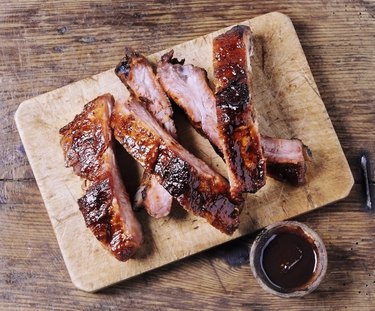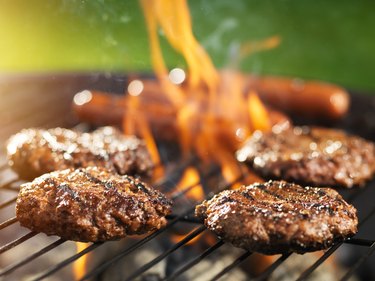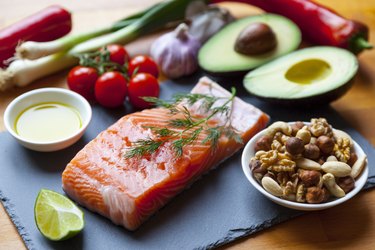
If you thought the keto diet was extreme, you're going to want to sit down for this one. The carnivore diet is taking low-carb eating to the next level. We're talking all meat, all the time — and pretty much nothing else.
If you're a meat-lover, that might sound like a dream come true. But before you start eating like a predator, you should know that the hype around this diet is pretty overblown — and going meat-only has some serious drawbacks.
Video of the Day
Video of the Day
Here's the full breakdown on the carnivore diet.
What Is the Carnivore Diet, Exactly?
The carnivore diet is based on the controversial belief that our ancestors ate mostly meat and fish. Proponents of the diet believe carbs are to blame for the high rates of chronic diseases like obesity and diabetes, which is why the carnivore diet aims for consuming zero carbs.
The most well-know proponent of the carnivore diet is Shawn Baker, a former orthopedic doctor and author of the book The Carnivore Diet, published November 2019. Baker claims the carnivore diet treats depression, diabetes, obesity, arthritis, autoimmune diseases and other chronic diseases. While he cites plenty of testimonials from his followers, there is no scientific research to date to back up his claims.
It's also important to note that Baker's medical license was revoked by the New Mexico Medical Board in 2017 due to concerns over his competency as a medical professional.

Is the Carnivore Diet Good for Weight Loss?
Any diet that limits your food intake down to one food group is likely to cause weight loss initially.
"The carnivore diet can be useful to jumpstart weight loss if the person is struggling to make progress in the early phase of dieting," Robert Santana, RD, dietitian and owner of Weights & Plates, tells LIVESTRONG.com. "However, long-term maintenance is unlikely due to the exclusion of many commonly eaten foods."
The diet also doesn't pair well with exercise, Santana adds. "Most people engaging in regular vigorous physical activity or training will struggle to perform due to the lack of carbohydrates in the diet."
Ultimately, he says, restrictive diets of any kind can result in weight loss, but the key is maintaining that weight loss, which requires consistent eating habits and a reasonable balance between carbohydrates, fat and protein.
When it comes to weight loss or maintenance, eating balanced meals and moving your body regularly are key to healthy and lasting progress.
What You Can and Can’t Eat on the Carnivore Diet
If you're wondering what you can eat on the carnivore diet the allowed foods list is pretty short.
Foods Allowed:
- Meat
- Fish
- Eggs
- Poultry
- Dairy (butter and hard cheeses only)
Foods Not Allowed:
- Grains
- Legumes
- Fruit
- Vegetables
- Nuts
- Seeds
- Processed foods
- Dairy that contains lactose
5 Drawbacks of the Carnivore Diet
1. High in Fat and Cholesterol
Since the carnivore diet focuses only on eating animal foods, and proponents suggest eating fatty cuts of meat, the diet is high in saturated fat and cholesterol. According to the American Heart Association (AHA), eating foods high in saturated fat raises the level of cholesterol, specifically LDL ("bad") cholesterol, in your blood. This rise in cholesterol can increase your risk for heart disease and stroke.
The AHA recommends limiting saturated fat to 6 percent of your daily calories. If you're consuming 2,000 calories per day, that would mean only 120 calories should come from saturated fat. This equates to about 13 grams of saturated fat per day.
The carnivore diet easily exceeds the AHA's recommendation for saturated fat. According to the USDA, one 4-ounce serving of ground beef provides 200 calories and 4.5 grams of saturated fat. If you were meeting your daily calorie needs (assuming a 2,000-calorie diet) eating ground beef alone, you would be consuming 45 grams of saturated fat. That's almost 3.5 times the daily recommendation.
"Excessive fats, especially saturated and trans fats, have been linked to weight gain and increased cholesterol levels, both leading to cardiovascular disease," Anthony DiMarino, RD, dietitian and founder of Eat Move Improve, tells LIVESTRONG.com.

2. Does Not Provide Enough Fiber
When you talk to most health professionals, they agree having a diet high in fiber is good for your health. According to the Mayo Clinic, fiber is found in fruits, vegetables, whole grains and legumes.
Benefits linked to a high-fiber diet include:
- Regular bowel movements
- Good bowel health
- Lower cholesterol levels
- Controlled bloods sugar levels
- Increased longevity
- A healthy weight
The Mayo Clinic recommends a minimum of 25 grams of fiber per day for women and 38 grams per day for men. Since the best sources of fiber include fruits, beans and other legumes, nuts and seeds and vegetables, it's unlikely someone following the meat-only carnivore diet will meet these fiber recommendations.
3. Restrictive and Lacking in Nutrition
The carnivore diet is a meat- and animal-product-only diet. Limiting your diet to only one food source severely limits your intake of vitamins, minerals and other antioxidants abundant in plant-based foods. Plant-based eating patterns like a vegetarian or Mediterranean diet have been widely researched and, according to Harvard Health Publishing, have been found to lower risk for heart disease, high blood pressure and diabetes.
In addition to limiting the nutritional benefit of your diet, restricting your diet to only meat and animal products can result in an unhealthy relationship with food. Family functions, work dinners and lunches with friends will all become extremely difficult if the only food you can consume is meat.
The National Eating Disorder Association lists the following eating behaviors as potential signs of an eating disorder:
- Preoccupation with food
- Cutting out entire food groups
- Consumption of only "healthy" foods
- Withdrawing from normal social activities
- Eating strange food combinations
4. Far from Eco-Friendly
With the entire mainstay of your diet coming from meat and other animal-based products, any goal of being friendly to the environment with your diet goes out the window. According to Harvard Health Publishing, sustainable diets are those with low environmental impacts. They are diets that are protective and respectful of biodiversity while optimizing natural and human resources.
The carnivore diet contributes to greenhouse gas emissions, as livestock produce nearly 15 percent of all global greenhouse gas emission, per Harvard Health Publishing, while plant-based diets are much easier on the environment.
5. Not a Long-Term Solution
When looking for a long-term solution to healthy eating, the carnivore diet is not your best bet.
"One of the incontrovertible truths of nutrition is just how good vegetables are for our health," Joshua Wolrich, a member of the Royal College of Surgeons of England, tells LIVESTRONG.com. "The carnivore diet literally laughs in the face of everything sensible. All of those vitamins and minerals that you get from fruit and vegetables are gone."

What to Do Instead
Whether your goal is to lose weight, gain muscle or just eat healthier, avoid fad diets like the carnivore diet.
Instead, opt for a well-researched eating pattern like the Mediterranean diet, which features lean meats, whole grains, heart-healthy fats and lots of fruits and veggies, ensuring a balanced and nourishing diet.
Ready to Adopt a Mediterranean Diet?
Start with this easy, 7-day meal plan.
- New Mexico Medical Board: "Board Actions"
- American Heart Association: "Saturated Fat"
- USDA: "Ground Beef"
- Mayo Clinic: "Dietary fiber: Essential for a healthy diet"
- Harvard Health Publishing: "What is a plant-based diet and why should you try it?"
- NEDA: "EMOTIONAL AND BEHAVIORAL SIGNS OF AN EATING DISORDER"
- Harvard Health Publishing: "Sustainability"